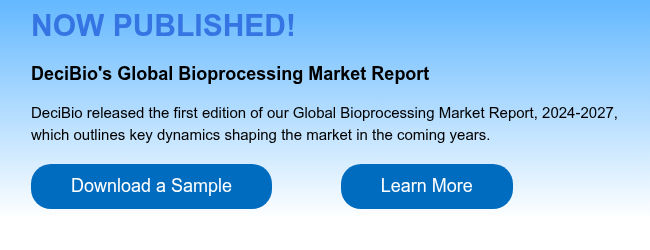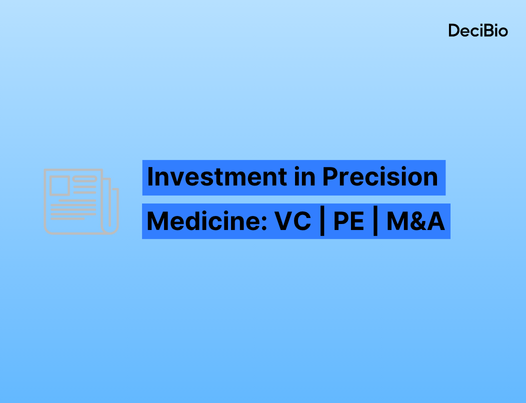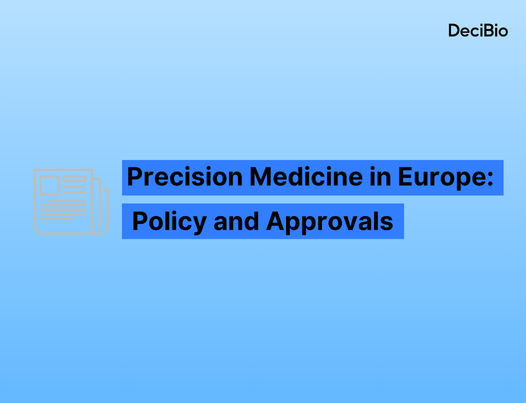Intro
August saw steady progress across AI in life sciences and healthcare, with milestones spanning regulation, partnerships, funding, and new tools. The FDA cleared its first AI pathology software for prostate cancer, MIT researchers reported novel antibiotic candidates, and Gameto advanced late-stage reproductive care trials. Meanwhile, Epic, Google, and others rolled out AI-enabled health platforms, signaling how clinical, consumer, and research applications are moving forward in parallel.
Happy reading!
The DeciBio team has updated the landscape analysis of all key techbio players with a clinical pipeline. Check out the updated visualizations here.
Is your team looking to speak with stakeholders, decision makers, or other KOLs? Dexter Experts is a self-service platform that lets you quickly & price effectively schedule 1-on-1 interviews or surveys. Reach out to the team for more info here.
AI in Drug Discovery
1 | Kyorin Implements Elix Discovery AI Platform for Drug R&D | Partnership
2 | Generative AI Framework Yields Novel Antibiotic Candidates Against Resistant Bacteria | New Research
AI in Diagnostics
1 | Artera Receives U.S. FDA De Novo Marketing Authorization for AI-Digital Pathology Software Revolutionizing Prostate Cancer Care | Product Launch
2 | Atropos Health and Novartis partner to improve diagnosis of rare blood disorder | Partnership
3 | Bill Gates backs $1M for AI-drive Alzheimer’s research | Funding
AI in Healthcare
1 | Epic unveils AI agents, showcases new foundational models | Product Launch
2 | Develop Health raises $14.3M for AI-automated prior authorization and medication access | Funding
3 | Pixel Watch 4: Design upgrades, new fitness features and expanded AI | Product Launch
Summaries
AI in Drug Discovery
1 | Kyorin Implements Elix Discovery AI Platform for Drug R&D | Partnership
Kyorin Pharmaceutical has adopted Elix Discovery, an AI-powered drug discovery platform developed by Tokyo-based Elix, Inc. The system provides a graphical interface that allows medicinal chemists to build predictive models and generate new molecular structures without coding. It supports ligand-based and structure-based design, including docking simulations and ADMET property predictions. Kyorin aims to use the platform to accelerate compound design and improve the quality of its research programs.
2 | Generative AI Framework Yields Novel Antibiotic Candidates Against Resistant Bacteria | New Research
A research team at MIT developed a generative deep-learning framework to design new antibiotic molecules. The approach combined fragment-based screening of more than 10 million fragments with an unconstrained generative algorithm. Of 24 compounds synthesized, seven showed selective antibacterial activity, and two (NG1 and DN1) demonstrated bactericidal effects against drug-resistant Neisseria gonorrhoeae and MRSA in mouse models. Both lead compounds operated through distinct mechanisms and showed low toxicity. The study highlights how AI can expand exploration into novel regions of chemical space for antibiotic discovery.
Gameto announced a $44 million Series C financing round, bringing its total funding to $127 million to advance late-stage clinical development of Fertilo, its iPSC-derived therapy for egg maturation. Fertilo is currently in a Phase 3 U.S. trial, designed as the first randomized, controlled, double-blind study of ex vivo egg maturation, and aims to shorten ovarian stimulation from two weeks of daily injections to just 2–3 days. The therapy has already been cleared in several international markets, with recorded pregnancies and live births, positioning it as a potential paradigm shift in IVF and reproductive care. Beyond Fertilo, Gameto is also developing menopause therapies through its Ameno program and leveraging an AI-powered organoid platform to accelerate women’s health drug discovery, underscoring its broader ambition to modernize reproductive and midlife care.
AI in Diagnostics
1 | Artera Receives U.S. FDA De Novo Marketing Authorization for AI-Digital Pathology Software Revolutionizing Prostate Cancer Care | Product Launch
The FDA has granted De Novo authorization to ArteraAI Prostate, making it the first AI-powered software approved to predict long-term outcomes for patients with non-metastatic prostate cancer and establishing a new category for AI-based digital pathology tools. The decision recognizes ArteraAI Prostate as a regulated Software as a Medical Device (SaMD) that can be implemented at qualified pathology labs, aiming to accelerate diagnosis and support more confident treatment decisions. The authorization also includes a Predetermined Change Control Plan, enabling future expansion of the technology across additional pathology scanners and underscoring Artera’s commitment to advancing personalized, multimodal AI-driven cancer care.
2 | Atropos Health and Novartis partner to improve diagnosis of rare blood disorder | Partnership
Atropos Health announced a collaboration with Novartis to build AI models that identify undiagnosed patients with paroxysmal nocturnal hemoglobinuria (PNH), a rare blood disorder, aiming to reduce the time from symptom onset to testing, diagnosis, and treatment. The models leverage the Atropos Evidence Network, which provides real-world data and enables integration of these tools directly into health system workflows. This partnership underscores both companies’ commitment to advancing precision medicine by accelerating rare disease diagnosis and improving patient outcomes through AI-driven real-world evidence.
3 | Bill Gates backs $1M for AI-drive Alzheimer’s research | Funding
Bill Gates, through Gates Ventures, has launched the Alzheimer’s Insights AI Prize, a $1 million competition to encourage development of AI tools capable of analyzing decades of Alzheimer’s research data to uncover new treatment approaches. The winning model will be released for free on the Alzheimer’s Disease Data Initiative’s cloud platform, giving scientists worldwide access to a resource designed to accelerate discovery. The competition opened in August, with further rounds in December and the final round in March 2026.
AI in Healthcare
1 | Epic unveils AI agents, showcases new foundational models | Product Launch
Epic Systems used its 2025 Users Group Meeting to unveil a suite of new agentic AI tools for clinicians, patients, and administrators, including Art (a clinical assistant), Emmie (a patient-facing chatbot), and Penny (a revenue management assistant). The company also introduced CoMET, a family of generative medical event transformer models trained on its Cosmos dataset of de-identified patient records, designed to scale the use of real-world evidence in clinical decision-making. Epic highlighted how these tools aim to improve operational efficiency, enhance patient engagement, and support more personalized care while integrating with partner technologies such as Microsoft’s Dragon ambient AI.
2 | Develop Health raises $14.3M for AI-automated prior authorization and medication access | Funding
Develop Health announced a $14.3 million Series A round led by Wing Venture Capital, bringing its total funding to $17.6 million, to expand its EHR-integrated platform that automates benefits verification and prior authorization. The company’s system, built on more than a dozen purpose-built large language model pipelines, streamlines insurance checks, generates and submits prior authorization packages, tracks status, and returns structured data directly into provider workflows, reducing manual effort. Develop Health aims to address the administrative barriers that delay patient access to medications, reporting an 80% reduction in form completion time and higher approval rates. The company plans to extend into the broader medical benefit market, deepen integrations with EHRs and PBMs, and scale its reach to help over one million patients access medications by the end of 2025.
3 | Pixel Watch 4: Design upgrades, new fitness features and expanded AI | Product Launch
Google unveiled the Pixel Watch 4, highlighting major health-focused AI upgrades, including advanced machine learning sleep tracking that is 18% more accurate and new AI-driven automatic workout detection. The watch also introduces a personal AI health coach powered by Gemini, offering proactive, personalized fitness and sleep guidance based on real-time biometric data. Additional enhancements include improved route tracking, expanded exercise modes, new skin temperature sensing for wellness monitoring, and integration with Fitbit’s reimagined app, positioning the device as both a smartwatch and an intelligent health companion.

.png)






.png)

.png)


